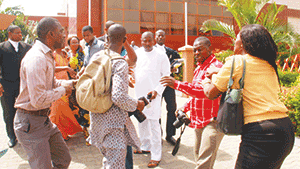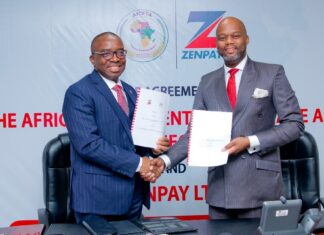Concerned about the safety of Nigerian media workers as the 2015 general elections draw nearer, UNESCO, in collaboration with NUJ, put together a workshop in Kaduna for journalists in Northern part of the country, on safety tips on election coverage. Assistant Editor (North), CHUKS EHIRIM, who just returned from the workshop, reports.

There is no doubt that the Nigerian journalist, as his counterparts from other parts of the world, has become an endangered specie. This is especially as activities for 2015 general elections gradually build up. The fear of 2015, to the average journalist in Nigeria, is the beginning of wisdom, particularly in reportage, given the cut-throat competition among politicians in the country.
This fear is also not misplaced, given the number of journalists that had lost their lives across the world in the discharge of their duties. Statistics, for instance, indicate that over 700 journalists had been killed in different parts of the world in the last 10 years. Out of this number, 32 were reportedly slaughtered in one day in Philippines.
The deaths had been on account of frictions with law enforcement agents, particularly the police. Others were hounded down by unidentified persons, presumably by persons aggrieved over news reportage allegedly tilted against them. Yet there are those killed in the cause of investigating cases of injustice, official corruption and other financial crimes.
In Nigeria, a number of journalists have also fallen to Boko Haram insurgency. In the Federal Capital Territory (FCT), an editor with the New Telegraph, Suleman Bisalla, was one of those killed at one of Abuja bombing incidents.
Penultimate week in Warri, Delta State, 14 journalists were taken hostage by a militant kingpin fondly called Tompolo. Another journalist, Ugorji Eke of the Nation, was also abducted in Aba, Abia State. He was released after days in captivity by his abductors.
Alarmed by the number of deaths and abductions of practising journalists, the United Nations Education, Scientific and Cultural Organisation (UNESCO) began a crusader role of promoting the safety of practitioners in Nigeria as the election year nears. At the Kaduna venue of one of the workshops penultimate weekend, measures to be adopted especially by the practitioners to guarantee their own safety were highlighted.
The speakers and resource persons at the workshop agreed that 40 per cent of the safety measures lie with the journalist himself while carrying out his constitutional functions.
From the police standpoint, it was taught that journalists should stick to the ethics of their profession and apply safety devices such as crash helmet, bullet-proof vests among others, when covering hazardous assignments.
Kaduna State Commissioner for Information, Ben Bako, while commending UNESCO for the workshop, lamented that some journalists have flung ethics to the wind in plying their trade. He urged journalists to be conscious of their environment in order not to be consumed therein by customs and traditions.
In his keynote address, Dr. Sola Adenyaju remarked that although the constitution spelt out functions for journalists, “the functions are not justiciable, as no special protection in terms of safety came with the responsibility, thus the journalist’s function is fraught with risks”.
He listed the challenges facing journalists to include threat from governments, lack of safety mechanism for their protection, issues of low wages and salaries or no wages at all, difficulty in investigating stories amid corruption which often compromises the journalist and forces him sometimes to drop investigative stories.
“It is common knowledge that this kills investigative journalism,” he said.
Other challenges, according to him, included sabotage by colleagues and superiors, intolerance by politicians, low level of professionalism and observance of ethics, manipulation by public office holders, lack of efficient, effective and timely justice and perception of division of the press.
Other militating issues that came in focus were the ownership influence, which seeks to protect themselves and the interest of their friends.
“Because of this, many journalists were said to have been fired, framed and or subjected to other forms of indignities,” he lamented.
Job insecurity, social media incursions, gender insensitivity or barring women journalists from covering certain places as well as lack of adequate equipment to carry out the journalistic functions are also factors which make the journalist vulnerable, it was noted.
Adenyaju also stressed that a weak union in the name of Nigeria Union of Journalists (NUJ) has not risen to the occasion to safeguard its members from the dangers that confront them. According to him, when the lecturers in University of Ilorin (UNILORIN) were threatened by government with sack, the Academic Staff Union of Universities (ASUU) fought on their behalf; the Nigerian Medical Association (NMA) fights for its members; the Nigerian Bar Association (NBA) fights for lawyers; while the NUJ has not done much to protect the safety of its members.
Another resource person from the University of Nigeria, Nsukka (UNN), Dr. Muyiwa Popoola, identified bias as a factor that sees journalists taking sides in their reportage, adding that 2015 is not going to be different, given that the polity is already heated up.
He prescribed conflict-sensitive journalism in which parties in a conflict are brought to the level plane discussion with a view to resolving the crisis at a negotiation table, as a way out.
He underscored language as a core concept in managing conflicts, arguing that the use of certain adjectives such as ‘embattled governor’, ‘generalissimo of politics’ among others add nothing other than inflaming ill-feeling among the political actors.
The coordinator, Professor Stella Okunna, who was commissioner in Anambra State, ranked the workshop as a success, not only for its record of good attendance but also as many journalists shared experiences of cases where their safety in the discharge of their duties were placed in jeopardy.
Participants condemned threats of dismissal by employers and superiors and other forms of official victimisation, identifying them as debilitating factors in performance of tasks by media practitioners.












